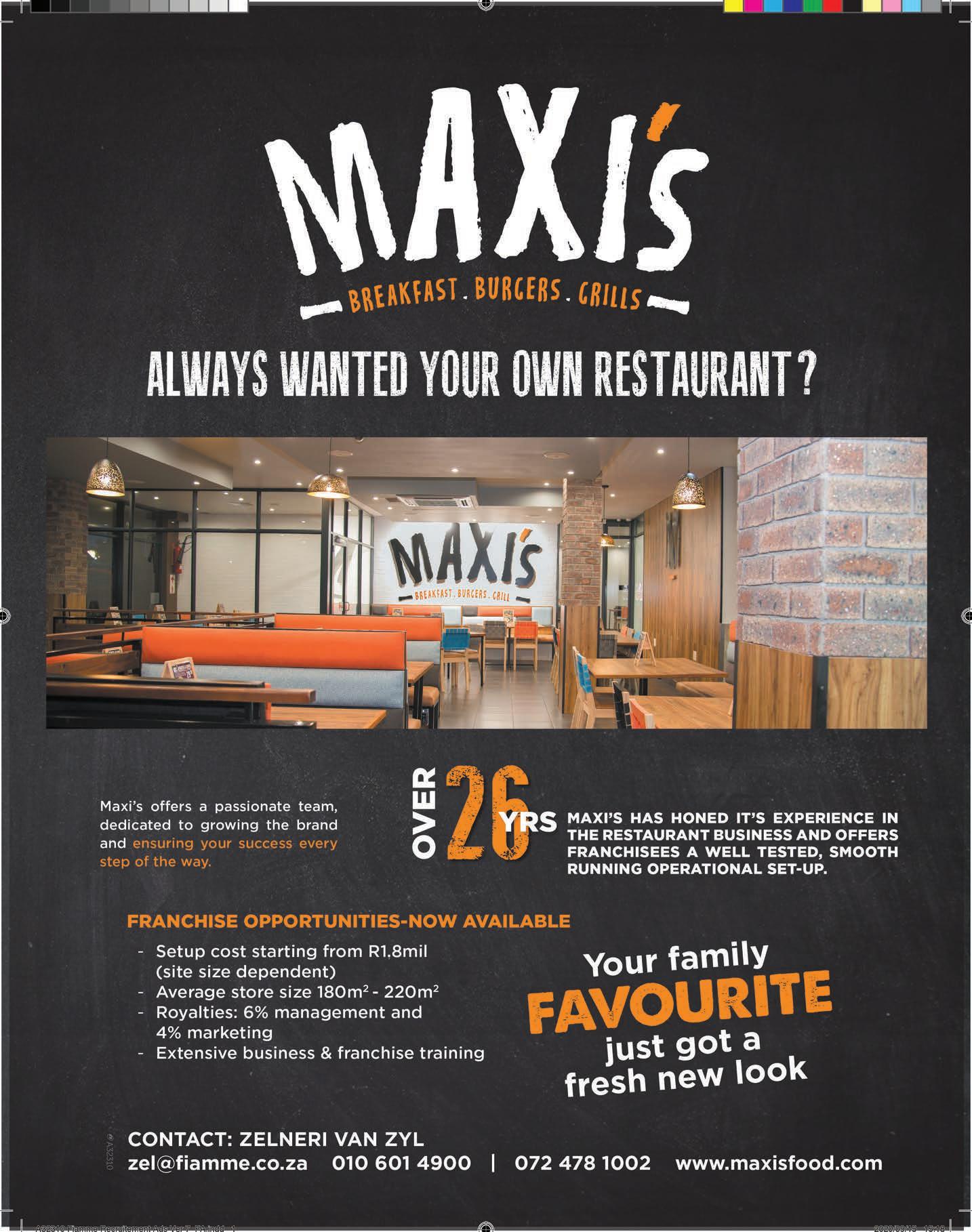
3 minute read
SYSTEMS
Working together
Tandem franchising is an innovative way to get started in business, reports BETH AMATO
The initial cost of setting up a franchise can be hefty (usually close to R1-million) and many South Africans simply don’t have access to the capital necessary to get a business off the ground. But there is a solution. Tandem franchising is run as a joint venture between a franchisorappointed mentor and a franchisee. This involves lower initial capital input and poses less of a risk to the franchisee than a traditional franchise agreement.
Eric Parker, one of the original shareholders in Nandos and a consultant and partner at Franchising Plus, explains that the beauty of tandem franchising is that it focuses on support, mentoring and long-term cooperation. It is also ideally suited to black economic empowerment (BEE) initiatives.
He says that many tandem franchisees have worked at the franchise for some time and are experienced in day-to-day operations. “This benefi ts the franchisor in the tandemfranchising deal: the franchisee is someone who is invested in the business already. It makes sense to enter an agreement with an existing and trusted staff member. In time, the franchisee can buy the franchisor out.
“It makes sense to enter an agreement with an existing and trusted staff member.” –Eric Parker, partner at Franchising Plus
“The current economic downturn makes tandem franchising an attractive option for corporates too,” says Parker. “If an employee is allowed to run a company branch, sales will certainly be increased and costs reduced. We’ve seen marginal branches become profi table.”
DID YOU KNOW? South African Breweries (SAB) was one of the fi rst pioneers of tandem franchising, enabling former employees to franchise the company’s distribution arm. Westonaria Beer Distributors was funded by SAB in 2005 and co-owned and managed by former employee David Mooi. Mooi had worked for 15 years in the company’s sales and distribution network and went on to employ 44 people.
Source: South African Breweries
Eric Parker


WHY TANDEM FRANCHISING?
The tandem-franchising model makes it possible for a dedicated and hardworking BEE franchisee to acquire outright ownership of the franchised business over three to ve years. At this point, the mentor withdraws and the arrangement converts to a standard franchise agreement.
Source: Franchising Plus
TANDEM-FRANCHISING OPTIONS
Component Implementation Summary
Mentorship programme
Equity Mentor (experienced manager) appointed by the franchisor. Franchisee purchases minority stake, often as little as 10 per cent, to be increased over time. Franchisor holds majority share
Financing/ until bought out. The balance of joint venture capital requirement is fi nanced by a fi nancial institution. Source: Franchising Plus
GETTING THERE
The average percentage of ownership by previously disadvantaged individuals has improved from 17 to 20 per cent in 2019.
The franchisee-franchisor relationship

Play.Lab is a creative educational business offering sensory and “messy” play experiences for children and teens to improve physical and social development. Here, children, their teachers and caregivers are found on the fl oor, engaging and sand. Play.Lab founder and owner, Lianne Godfrey, started the business in 2015 in Cape Town, but its rapid growth and her limited capacity meant that franchising Play.Lab was the best option.
Her franchisees need to invest wholeheartedly in promoting children’s health and wellbeing. Many of the people who approach Godfrey about opening a Play.Lab franchise are young mothers aiming to earn an income, but who still have time for family activities and responsibilities.
“I am passionate about uplifting women, especially mothers, through entrepreneurial ventures,” says Godfrey. “I hope that these women triple their incomes and employ
Play.Lab
others too.” Godfrey says that a substantial part of the franchisor-franchisee agreement is ongoing mentorship and support.
A seven-day training session covering common business practices is part of every franchisee’s on-boarding package. Franchisees also learn about the materials used and are guided through stringent health and safety protocols.
“I see my franchisees as part of a big family,” says Godfrey. “I am in touch with them all the time. I believe in open communication channels. All our ideas and discoveries are shared.”
in structured activities including things like paint, water
Source: The SA Franchise Market report
GOLDEN OLDIE
Steers is South Africa’s oldest franchise and has 522 stores worldwide. It opened its rst store in Johannesburg in 1963 and started franchising in 1965.











